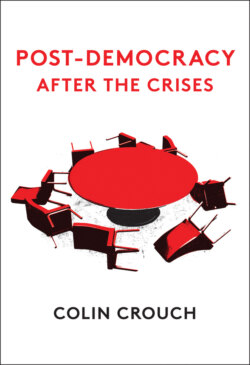Читать книгу Post-Democracy After the Crises - Colin Crouch - Страница 8
1 What Is Post-Democracy?
ОглавлениеRecent general election campaigns in the United Kingdom have presented a visual image of what I mean by post-democracy that is more expressive than many words – and I expect the same images are prominent in other mature democracies too. A politician appears on the television news making a speech, surrounded by enthusiastic supporters, carefully balanced for all ages and races and both genders, waving placards bearing slogans of the party in question. It has all the marks of a politician embedded in the people, who are demonstrating their spontaneous excitement. But the placards have all been produced by a central source, not autonomously by those holding them. Sometimes the mischievous camera pans back to reveal that the politician and the little group of supporters are actually standing alone, together with a few media representatives, in a corner of a large, empty warehouse. There is no larger audience; this is not a public meeting. These gatherings are held in different cities, politicians being required to travel vast distances in order to show that they cover the country in their determination to meet the people. But the warehouses are nearly always on the edge of a city, around ring roads and motorway approaches where virtually nobody ever goes. For reasons of security, traffic congestion and fears of encountering hostile citizens, these election rallies rarely approach a population. All the trappings of democratic encounters are there: all parts of the country are visited; the politicians stand among highly diverse groups of persons, not isolated on a platform; they make strong and emotional appeals. But the event is as empty of serious encounter as are the warehouses in which they are staged.
The idea of ‘post-’ is very frequently used today: post-industrial, post-modern, post-liberal, post-ironic. This suggests a society that knows where it has been and what it is ceasing to be, but not where it is going. However, it can also mean something very precise. Essential to ‘post-’ is the idea of a parabola through which the phenomenon in question passes over time. The general idea is depicted in Figure 1.1. After its initial appearance, it grows in significance, eventually reaching a peak, after which it subsides in importance. Its importance ‘score’ eventually seems no higher than in its early years, but accumulations over time do not easily disappear. Their mark is left in memories and, more importantly, in institutions that were created by the phenomenon during its dominant period and that, at least for a time, are not abolished. For this reason, the situation after, say, 70 years is not the same as at year 0. Let us take the case of ‘post-industrialism’, a phenomenon that can be measured fairly clearly as either the proportion of gross domestic product (GDP) or the proportion of employment accounted for by manufacturing industry. This first rose from low levels during early industrialization, reached a peak (in most western economies during the 1970s), and then declined. Today its level resembles that of industrialism’s earlier years. But this does not mean that we are reverting to being ‘pre-industrial’ or ‘non-industrial’. The accumulations of industrialism and their impact on our lives are still with us; we have become ‘post-industrial’.
Figure 1.1 The parabola: from pre- to post- in the life of a phenomenon
A similar point applies to democracy. The fact that, as I argue below, democracy has lost strength in recent decades does not mean that we are living in pre- or non-democratic societies. The achievements of the democratic period have left a major legacy of practices, attitudes, values and institutions. These are still active. This gives ground for optimism, but it also explains something important about post-democracy: we do not notice that democracy has weakened, because its institutions and habits remain; but the real energy of the political system has passed into the hands of small elites of politicians and the corporate rich, who increasingly ensure that politics responds to their wishes.
In a criticism of my concept, Stephen Welch argued in Hyperdemocracy (2013) that rather than a decline of democracy, we are today trying to have too much of it, politicizing issues that are inappropriate for such treatment. But he and I are talking about two sides of the same coin. I would reconcile our positions by pointing out that when political debate is about nothing, it tries to be about everything. When there is very little real debate over major policy directions (a fundamental characteristic of post-democracy), politicians start exploring every little avenue they can in order to claim that they have found a difference from their opponents – anything from each other’s personal morality to the desirability of particular medical treatments or ways of teaching children to read. This leads to an intrusion of politics – whether democratic or not – into areas with which it is not well equipped to deal.
To sustain my argument that changes in our political life can be described as steps on a road towards post-democracy, I need to demonstrate two things: first, that there was a period in the recent past when democracy could be said to have been strong; and second, that there has been a falling away since. The first requires identification of a ‘democratic moment’.
